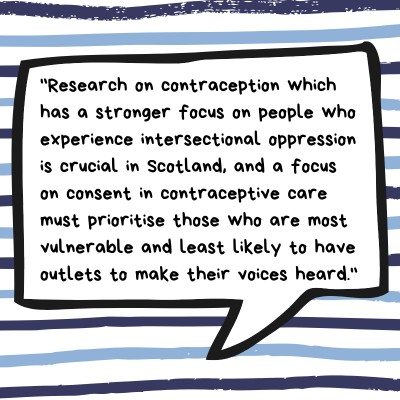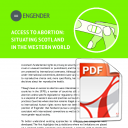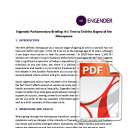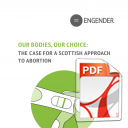Engender blog
Guest Post: Exploring contraception as a feminist issue

As discussions around schemes which offer women support on the condition they utilise long-acting reversible contraceptives (LARC) continue, we've hosted a series of blogs by Elspeth Wilson discussing her research into how LARC has historically been - and continues to be - used to control the fertility of marginalised people. Read Elspeth's previous blogs here.
In her final blog, Elspeth explores adequate and accessible contraceptive care as a feminist issue.
The Pause programme highlights that accessible contraception is only one part of the fight for adequate contraceptive care. Conversations on contraception frequently focus on access and whether and how people can get the kind of contraception they want to use. Obviously, this an important concern but it is only one side of the conversation. I hope that in my discussion of consent and information in the other blogs in this series I have been able to show that the question of who gets offered what contraception and why must also be central to feminist discussions of contraceptive care. If we are to approach contraception as an intersectional feminist issue the question of whose fertility is (de)valued and whose is seen as something to be controlled is imperative.
In my time using both the hormonal and non-hormonal coils, I frequently struggled to get accurate information from doctors and encountered difficulty getting my coil removed when suffering from repeated bacterial vaginosis. Through persistence I was able to get the contraceptive care I needed but not everyone has the resources or the ability to make their voice heard to be able to achieve this. If I, as a middle-class, white, cisgender woman, encountered difficulties getting adequate contraceptive care then it is likely that the situation is worse for people who do not have these privileges. Researchers in America found that when shown a video of 27-year-old women from different socioeconomic groups and races, doctors were more likely to recommend an IUD to low-income women of colour than low-income white women (Dehlendorf et al, 2010). Of course, getting recommended an IUD is not in itself a bad thing but the reasons why some people are more likely to be offered them speaks to whose fertility is seen as desirable and whose is not. Engender’s (2018) own research in Scotland highlighted the unsatisfactory experiences of disabled women when it comes to contraception and the fact that they are more likely to be prescribed long-acting contraception without necessarily being involved in the choice, a practice which has been documented for decades and still continues.
In my own research, participants believed that factors like their youth impacted their ability to be taken seriously and subsequently the advice on LARC that they received. Decisions to promote LARC to a patient are potentially informed by assumptions about their desire/need for effective contraception and it is vital that their thoughts and wishes are included in this conversation. As Gomez, Fuente and Allina (2014) say in their discussion of LARC in a U.S. context, “Our concern is that when efforts move beyond ensuring access for all women to promoting use among “high-risk” populations through programs and contraceptive counselling aimed at increasing uptake of LARC methods, the effect is that the most vulnerable women may have their options restricted.”
And it is not only clinicians that need to reflect on this, but also policymakers, feminists and anyone who is interested in reproductive rights. The question of who is considered most in need of LARC is brought into urgent focus by the introduction of the Pause programme to Scotland. Support for vulnerable people should never be conditional on a state-mandated choice of contraceptive method. People, like myself, need to speak but we also need to listen to other voices. I really regret not having a greater diversity of participants in my research in terms of race and gender identity, as the majority of them were white and all were either cisgender or did not disclose their gender identity. Further research is sorely needed that focuses on lived experience, especially that of people living at the intersection of marginalised identities, and does not make assumptions about the needs of particular groups without centring their voices. Research on contraception which has a stronger focus on people who experience intersectional oppression is crucial in Scotland, and a focus on consent in contraceptive care must prioritise those who are most vulnerable and least likely to have outlets to make their voices heard. Let's use the Pause program as a stimulus to listen, treat patients as individuals and broaden the scope of why contraception must be treated as a feminist issue.
References
Dehlendorf, Christine, Ruskin, Rachel, Grumbach, Kevin, Vittinghoff, Eric, Bibbins-Domingo, Kirsten, Schillinger, Dean, Steinauer, Jody E. 2010. ‘Recommendations for intrauterine contraception: a randomized trial of the effects of patients' race/ethnicity and socioeconomic status.’ American Journal of Obstetrics and Gynaecology 203(4): 319.e1-319.e8.
Engender, 2018. Our Bodies, Our Rights: Identifying and removing barriers to disabled women’s reproductive rights in Scotland. Engender: Edinburgh.
Gomez, Anu Manchikanti, Fuentes, Liza, and Allina, Amy. 2013. ‘Women or LARC First? Reproductive Autonomy and the Promotion of Long-Acting Reversible Contraceptive Methods’. Perspectives on Sexual and Reproductive Health. 46:3: 171-5.
Elspeth is a researcher and writer with a focus on public health, medical anthropology and gender. Originally trained in social anthropology, she recently completed her MPhil in Gender Studies at Trinity College Dublin. She is currently working on a project about the experience of pleasure post-trauma and is always looking for creative, interdisciplinary ways to approach research. You can find her @ellijwilson and @propleasurable.
Guest posts do not necessarily reflect the views of Engender, and all language used is the author's own. Bloggers have received some editorial support from Engender, and may have received a fee from our commissioning pot. We aim for our blog to reflect a range of feminist viewpoints, and offer a commissioning pot to ensure that women do not have to offer their time or words for free.
Interested in writing for the Engender blog? Find out more here.
Share this post on …
Comments: 0 (Add)
Downloads
 Access to Abortion: Situating Scotland in the Western World
This paper describes the different legal and regulatory contexts for abortion healthcare in Scotland and in other European and western nations.
Access to Abortion: Situating Scotland in the Western World
This paper describes the different legal and regulatory contexts for abortion healthcare in Scotland and in other European and western nations.
 Engender Parliamentary Briefing: It’s Time to End the Stigma of the Menopause
This briefing was written for a debate in the Scottish Parliament (S5M-17347: It’s Time to End the Stigma of the Menopause), exploring women's experiences of the menopause in Scotland.
Engender Parliamentary Briefing: It’s Time to End the Stigma of the Menopause
This briefing was written for a debate in the Scottish Parliament (S5M-17347: It’s Time to End the Stigma of the Menopause), exploring women's experiences of the menopause in Scotland.
 Our bodies our rights - Identifying and removing barriers to disabled women's reproductive rights in Scotland
Since 2013, Engender has been working with disabled women and disabled people’s organisations on a project to discuss the key issues facing women and girls in Scotland, and to enable a deeper and richer conversation about reproductive rights.
Our bodies our rights - Identifying and removing barriers to disabled women's reproductive rights in Scotland
Since 2013, Engender has been working with disabled women and disabled people’s organisations on a project to discuss the key issues facing women and girls in Scotland, and to enable a deeper and richer conversation about reproductive rights.
 Our Bodies, Our Choice: The Case for a Scottish Approach to Abortion
The devolution of abortion law as part of the Scotland Act 2016 also provides Scotland with the opportunity to develop a Scottish approach to women’s reproductive rights, incorporating improved, modernised and standardised service provision underpinned by a progressive devolved legal framework.
Our Bodies, Our Choice: The Case for a Scottish Approach to Abortion
The devolution of abortion law as part of the Scotland Act 2016 also provides Scotland with the opportunity to develop a Scottish approach to women’s reproductive rights, incorporating improved, modernised and standardised service provision underpinned by a progressive devolved legal framework.

Newsletter
Sign up to receive our newsletter here:
Sign up to our mailing list
Receive key feminist updates direct to your inbox: